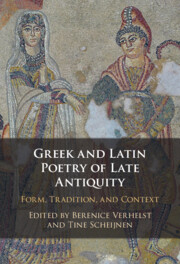Book contents
- Greek and Latin Poetry of Late Antiquity
- Greek and Latin Poetry of Late Antiquity
- Copyright page
- Contents
- Figures
- Contributors
- Introduction
- Part 1 A ‘Late’ Perspective on the Literary Tradition
- Part 2 Late Antique ‘Genres’ and ‘Genre’ in Late Antiquity
- Part 3 The Context of Late Antiquity
- Chapter 8 Saying the Other
- Chapter 9 Internal Audiences in the New Testament Epics of Juvencus and Nonnus
- Chapter 10 Colluthus and Dracontius
- Chapter 11 Objects of the Lusting Gaze
- Chapter 12 Metamorphosis and Mutability in Late Antique Epic
- Bibliography
- General Subject Index
- Index Locorum
Chapter 10 - Colluthus and Dracontius
Mythical Traditions and Innovations
from Part 3 - The Context of Late Antiquity
Published online by Cambridge University Press: 16 June 2022
- Greek and Latin Poetry of Late Antiquity
- Greek and Latin Poetry of Late Antiquity
- Copyright page
- Contents
- Figures
- Contributors
- Introduction
- Part 1 A ‘Late’ Perspective on the Literary Tradition
- Part 2 Late Antique ‘Genres’ and ‘Genre’ in Late Antiquity
- Part 3 The Context of Late Antiquity
- Chapter 8 Saying the Other
- Chapter 9 Internal Audiences in the New Testament Epics of Juvencus and Nonnus
- Chapter 10 Colluthus and Dracontius
- Chapter 11 Objects of the Lusting Gaze
- Chapter 12 Metamorphosis and Mutability in Late Antique Epic
- Bibliography
- General Subject Index
- Index Locorum
Summary
Around 500 CE Colluthus, writing in Greek, and Dracontius, writing in Latin, each composed an epyllion on the Abduction of Helen. However, apart from title, date, and genre, the two works have very little in common. This chapter presents an interpretation of the two poems that connects them with contemporary historical and social developments. On the one hand, the role of Hermione in Colluthus is connected with the changing role of children in late antique society, under the influence of Christian morality. On the other, the attitude towards Vergil in Dracontius is explained from the late antique political context (being after the fall of Rome) and the perspective of the author as an advocate in Carthage under Vandal rule. A comparison between the two poems sheds interesting light on how the ‘antehomeric’ narrative was adapted respectively in the East and the West: in Colluthus' Egypt and in Dracontius' Africa.
Keywords
- Type
- Chapter
- Information
- Greek and Latin Poetry of Late AntiquityForm, Tradition, and Context, pp. 205 - 221Publisher: Cambridge University PressPrint publication year: 2022



